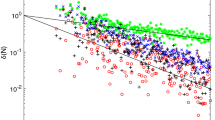Abstract
New algorithms for stochastic approximation under input disturbance are designed. For the multidimensional case, they are simple in form, generate consistent estimates for unknown parameters under “almost arbitrary” disturbances, and are easily “incorporated” in the design of quantum devices for estimating the gradient vector of a function of several variables.
Similar content being viewed by others
REFERENCES
Granichin, O.N., Stochastic Approximation with Input Perturbation for Dependent Observation Disturbances, Vestn. Leningrad. Gos Univ., 1989, Ser. 1, no. 4, pp. 27–31.
Granichin, O.N., A Procedure of Stochastic Approximation with Input Perturbation, Avtom. Telemekh., 1992, no. 2, pp. 97–104.
Granichin, O.N., Estimation of the Minimum Point for an Unknown Function with Dependent Background Noise, Probl. Peredachi Inf., 1992, no. 2, pp. 16–20.
Polyak, B.T. and Tsybakov, A.B., On Stochastic Approximation with Arbitrary Noise (The KW Case), in Topics in Nonparametric Estimation. Adv. in Soviet Mathematics. Am. Math. Soc., Khasminskii, R.Z., Ed., 1992, no. 12, pp. 107–113.
Polyak, B.T. and Tsybakov, A.B., Optimal Accuracy Orders of Stochastic Approximation Search Algorithms, Probl. Peredachi Inf., 1990, no. 2, pp. 45–53.
Spall, J.C., A Stochastic Approximation Technique for Generating Maximum Likelihood Parameter Estimates, Am. Control Conf., 1987, pp. 1161–1167.
Spall, J.C., Multivariate Stochastic Approximation Using a Simultaneous Perturbation Gradient Approximation, IEEE Trans. Autom. Control, 1992, vol. 37, pp. 332–341.
Alspector, J., Meir, R., Jayakumar, A., et al., A Parallel Gradient Descent Method for Learning in Analog VLSI Neural Networks, in Advances in Neural Information Processing Systems, Hanson, S.J., Ed., San Mateo: Morgan Kaufmann, 1993, pp. 834–844.
Maeda, Y. and Kanata, Y., Learning Rules for Recurrent Neural Networks Using Perturbation and Their Application to Neuro-control, Trans. IEE Japan, 1993, vol. 113–C, pp. 402–408.
Chen, H.F., Duncan, T.E., and Pasik-Duncan, B., A Kiefer-Wolfowitz Algorithm with Randomized Differences, IEEE Trans. Autom. Control, 1999, vol. 44, no. 3, pp. 442–453.
Ljung, L. and Guo, L., The Role of Model Validation for Assessing the Size of the Unmodeled Dynamics, IEEE Trans. Autom. Control, 1997, vol. 42, no. 9, pp. 1230–1239.
Granichin, O.N., Estimation of Linear Regression Parameters under Arbitrary Disturbances, Avtom. Telemekh., 2002, no. 1, pp. 30–41.
Kushner, H.J. and Clark, D.S., Stochastic Approximation Methods for Constrained and Unconstrained Systems, Berlin: Springer-Verlag, 1978.
Shor, P.W., Quantum Computing, 9 Int. Math. Congress, Berlin, 1998.
Faddeev, L.D. and Yakubovskii, O.A., Lektsii po kvantovoi mekhanike dlya studentov matematikov (Lectures on Quantum Mechanics for Students of Mathematics), St. Petersburg: RKhD, 2001.
Robbins, H. and Siegmund, D., A Convergence Theorem for Nonnegative Almost Super-Martingales and Some Applications, in Optimizing Methods in Statistics, Rustagi, J.S., Ed., New York: Academic, 1971, pp. 233–257.
Polyak, B.T., Vvedenie v optimizatsiyu (Introduction to Optimization), Moscow: Nauka, 1983.
Author information
Authors and Affiliations
Rights and permissions
About this article
Cite this article
Granichin, O.N. Randomized Algorithms for Stochastic Approximation under Arbitrary Disturbances. Automation and Remote Control 63, 209–219 (2002). https://doi.org/10.1023/A:1014291407082
Issue Date:
DOI: https://doi.org/10.1023/A:1014291407082




